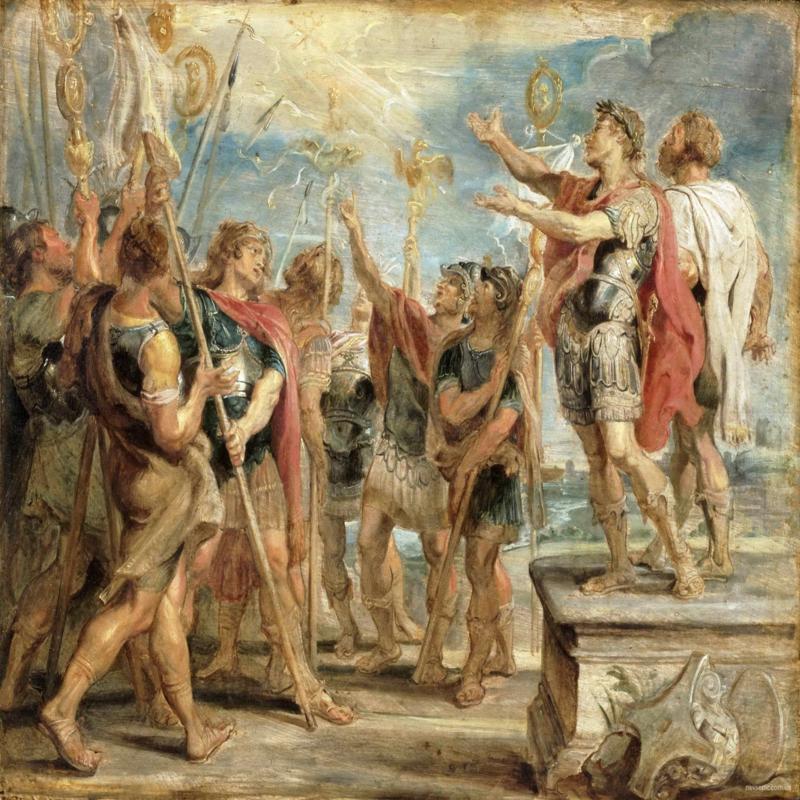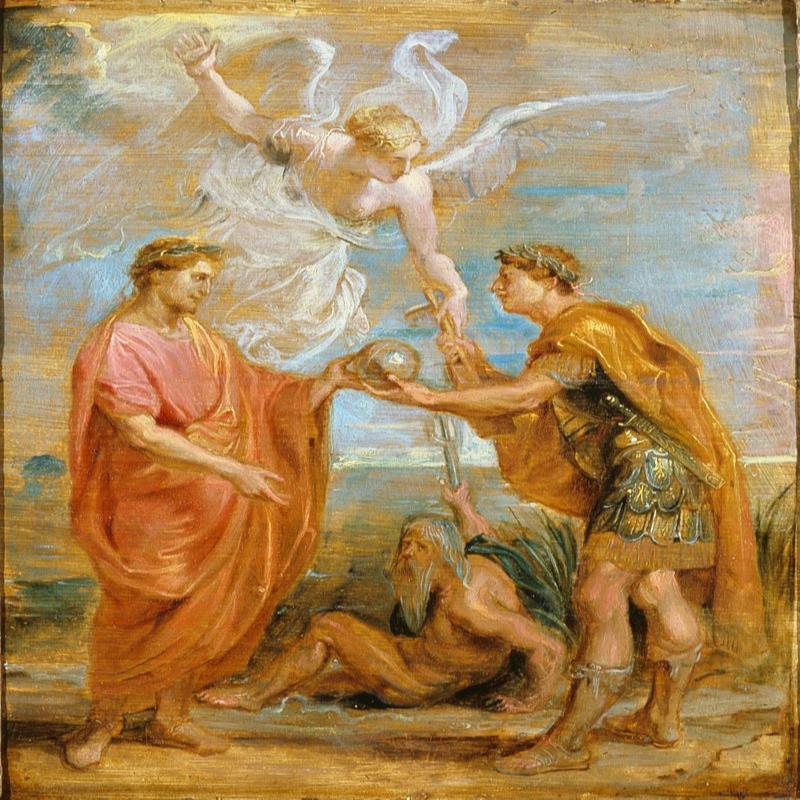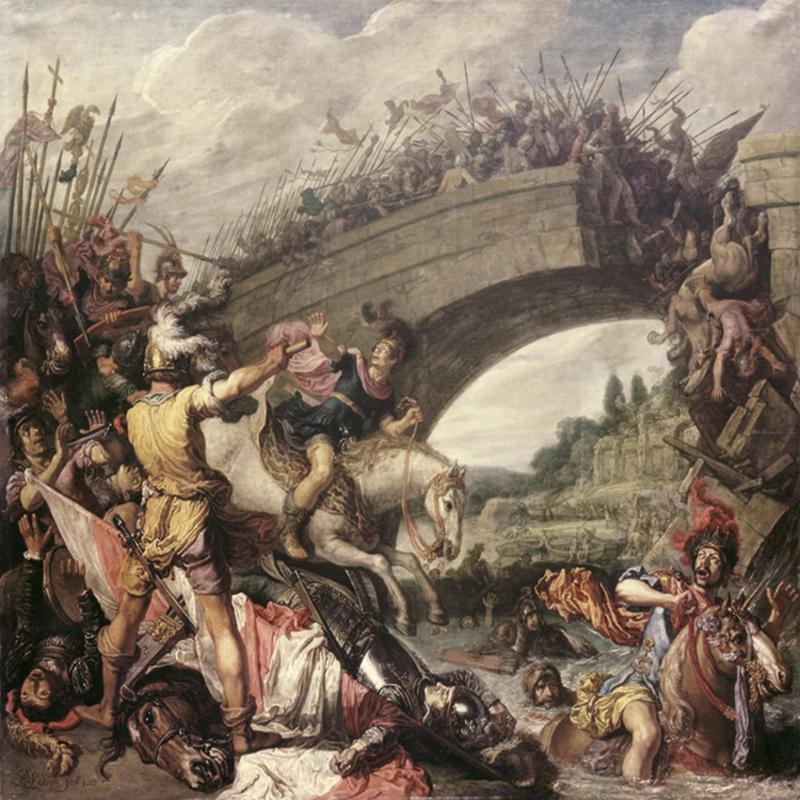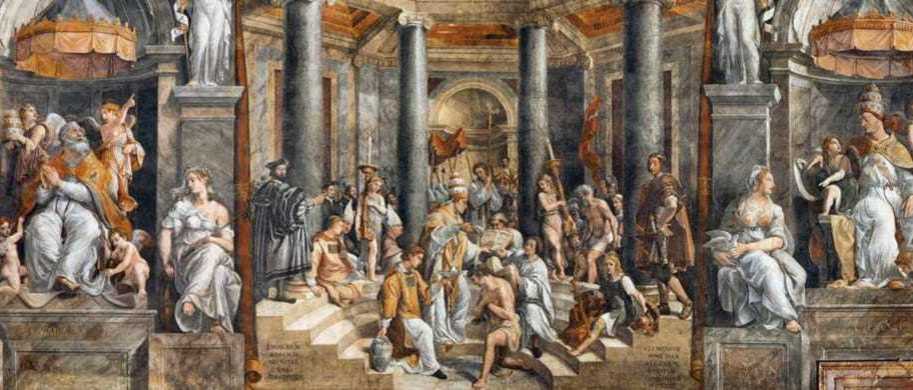Constantine I: The Vision of the Cross
Posted on 23rd January 2021
As Constantine the Great he was the first Christian Emperor of Rome, the man who took it from a minority cult liable to persecution to the established religion of much the then known world.
There had of course been Christian settlements scattered around Europe and the Middle East particularly in Greece and Anatolia for many years, and there was also a large community in Rome itself, but it was to be Constantine's adoption of Christianity as the one true faith and the legitimacy this brought along with the political protection, he provided that facilitated its spread - but why Constantine and why Christianity? After all, he was never a Christian as we would understand it.

He was born Flavius Valerius Constantinus in AD 272 in the town of Naissus in modern day Serbia. His father Constantius was an Officer in the Imperial Guard, a well-respected man who rose rapidly through the ranks to become Governor of Dalmatia; but it was not his father who though superstitious as most Romans were who introduced the young Constantine to Christianity, but his low born mother Helena.
At the time of Constantine's birth Rome no longer possessed the resources or indeed the manpower to effectively police an Empire that was large, difficult to administer and threatened its length and breadth by migrating tribes. As a result, in July, AD 285 the Emperor Diocletian took the unprecedented step of dividing it up.. He appointed his colleague Maximian as Emperor in the West with his capital at Mediolanum (Milan) or sometimes Trier in Germany, while he continued to rule in the East from Nicomedia or Izmet in Turkey.
Both parts of the Empire would be governed independent of each other, but Diocletian would be the senior Augustus or Caesar. This permitted both Emperors to govern their territories more effectively and to secure their own borders. The new system worked so well that in AD 293, Diocletian decided to sub-divide the Empire.
Both the Western and Eastern halves of the Empire would now have two Emperors who would have complete jurisdiction in the areas they controlled. The junior Emperor would however be subordinate to the senior Emperor just as they were all subordinate to Diocletian himself.
In the East Diocletian chose Galerius, a coarse, brutal, but loyal servant as his subordinate while Maximian in the West appointed Constantine's father Constantius who had earlier divorced his wife Helena to marry Maximians's step-daughter and thereby seal his position in the new political system that was to become known as the Tetrarchy.
The two senior Emperors adopted the sons of their subordinates and both Constantine and Maximian's son Maxentius, were sent East to live in the Court of Diocletian. This indicated that there was to be a line of succession something that was necessary perhaps but would be the source of friction.
From AD 295 to AD 299 Diocletian waged war on the Sarsannid Persian Empire in a hard-fought campaign that did not always go the Romans way. Galerius, who had a hatred for religious cults blamed Christian influence at the Imperial Court for undermining the Roman army and that they were in fact praying for its defeat. Diocletian likewise had little time for the Christians and had earlier ordered the Deacon Romanus of Caesaria to have his tongue cut out before having him executed merely for his arrogance in speaking out of turn. He would however have been satisfied in merely having them excluded from all official posts. Galerius was more strident and insisted upon their extermination.
In AD 303, Diocletian bowed to the pressure from Galerius and ordered a general persecution of Christians across the Empire; Christian places of worship were destroyed, scriptures burned, and their clergy hunted down and executed. The persecutions proved a failure for instead of expunging Christianity as intended it merely created martyrs which as a fundamental tenet of Christian belief only increased its influence. Even Galerius was forced to concede this and in AD 311 the persecutions ceased, though Christians were still widely discriminated against.
Constantine had received his schooling in the Court of Diocletian where he had learned philosophy, Greek, and studied Latin literature. He also regularly attended lectures given by Christian scholars. He was a fast learner and quickly became familiar with the political intrigue of the Imperial Court and how to manipulate it to his advantage. He also gained his first military experience fighting alongside Galerius in the war against the Persians and was to prove himself an able and courageous soldier.
On 1 May AD 305, Diocletian was forced to retire due to a long-standing illness and as had previously been agreed Maximian did likewise in the West. Constantius and Galerius were now promoted to senior Augustus, but this did not see either Constantine or Maxentius promoted to be their subordinates. Instead in his resignation speech Diocletian had named Flavius Valerius Severus, an old friend of Galerius as subordinate Augustus in the West and Maximinus Daia, a nephew of Galerius, as subordinate Augustus in the East. Galerius had been instrumental in this decision trusting neither his own son nor Constantine

Constantine now quickly became aware that he was little more than a hostage in the Eastern Court and his father Constantius became fearful for his son's life. He made numerous requests to Galerius to allow his son to join him in the West. His requests were always refused but one night when Galerius was drunk Constantine asked if he could leave. Galerius agreed and Constantine wasting no time fled that same night. Once safely back in the West, Constantius took his son on campaign to Britannia where he would be protected from a sober Galerius's wrath and could ignore any orders for him to return.
Their time in Britannia together was to be short-lived when on 25 July, AD 306 Constantius fell ill and died at Eboracum (York). Following his father's death his Legions proclaimed Constantine his successor.
Constantine was aware of the weakness of his position having only been proclaimed Emperor by a relatively small number of soldiers who were far removed from the land he would have to rule. But he did not want to deter them having already been overlooked for the position of subordinate Augustus and knowing full-well that Galerius would never appoint him to the role. So, he treated the situation as a fait accompli, but not one he had engineered himself.
Constantine now embarked on a series of long and difficult negotiations with Galerius that resulted in him agreeing to confirm Constantine as the eventual successor to Severus. It was less than Constantine had hoped for, but he had little choice but to agree.
Maxentius who had also been overlooked as a future Augustus was furious and refused to accept Constantine's appointment. In a rage he spat on his portraits, smashed his statues, and defaced his coins. To pre-empt Constantine, he rallied his army and on 28 October AD 306, declared himself subordinate Augustus in the West. Galerius immediately ordered Severus to quell the rebellion and bring the young man to heel but he was defeated in battle and imprisoned.
In victory Maxentius felt he could ignore Galerius and in the end his father was forced to come out of retirement to broker a truce between his son and Constantine. He offered his daughter Fausta's hand in marriage to Constantine to placate him and a fragile peace was established.
Constantine now focused upon building up his power base around Trier. He defeated those German tribes, the Alemanni and the Bructeri that had been massing on the border in a quick and brilliant campaign. He also revealed his ruthlessness by feeding their leaders to beasts in the Amphitheatre.
Constantine’s success only increased the rivalry between himself and Maxentius, however.
On 11 November AD 308, Galerius called a Council to try and resolve the difficulties in the West and the ailing Diocletian was persuaded to come out of retirement to lend weight to its decisions: Maximian who had brokered the earlier peace was again forced to stand down while Severus who had died in captivity was replaced as Augustus in the West by Gaius Valerius Licinius with both Constantine and Maxentius as his subordinates but neither of them was willing to accept the decision for both now wanted the Imperial Purple for themselves.
In AD 310, Maximian taking advantage of the chaos that reigned emerged from his enforced retirement and tried to capture the throne for himself but defeated in battle he was forced to flee to the Court of Constantine for his own protection. After initially showing clemency Constantine later forced his father-in-law to commit suicide.
In early May AD 311, Galerius died to be replaced as senior Emperor in the East by Licinius. In the meantime, Maxentius had declared himself senior Augustus in the West. The all-out war that had long been brewing between Constantine and Maxentius was now inevitable and in the Spring of AD 312, Constantine led an army of 40,000 men across the Alps and into Italy.
Constantine advanced on Rome virtually unimpeded as Maxentius withdrew his forces behind the seemingly impregnable walls of the city where he prepared for a prolonged siege if necessary. After all, he had the loyalty of the Praetorian Guard, and the city was well-stocked with grain from North Africa. But he was unable to gauge the changing mood of the Roman people and as the towns and cities of northern Italy fell to Constantine the Romans began to turn on their Emperor. There were street disturbances, Maxentius was verbally abused in the street and at the Chariot Races the crowd chanted not his but Constantine's name.
Maxentius was nervous of meeting Constantine in open battle and so conferred with the Augurs hoping for an auspicious sign, but none was forthcoming. Nonetheless unable to depend upon the support of the Roman people he had little choice but to advance his army over the River Tiber on a hastily constructed and flimsy pontoon bridge having earlier partially destroyed the Milvian Bridge intending to hamper Constantine's advance.
Constantine was heavily outnumbered, and he was advised to withdraw but there was no doubt in his mind that he would be victorious for on the eve of the battle he'd had a vision. The historian Eusebius described what happened: "He saw with his own eyes in the heavens the Cross arising from the light of the sun, carrying the message In Hoc Signo Vincesa- In This Sign Conquer.
A meteorological phenomenon was widely reported but Constantine either truly saw it as a Sign from God or he knew how to take advantage of it as such.
Later that same night he claimed to have had a dream where he received a visitation from Christ who told him to make a standard, a labarum, for his army in the shape of the cross. On the morning of the battle, he told his troops of his vision and ordered them to mark their shields with the sign of the cross. If they did so they would conquer and if they died, they would be assured their place in heaven. To the many Christians in his army, it was a revelation and the sign of the One True God.
Maxentius had positioned his army poorly deploying them too close to the river bank giving them little room for manoeuvre - it was also said that the fear on his face was visible to all.

The battle was over almost before it began when Constantine's cavalry confident in his vision charged with such fury that both flanks of Maxentius's army quickly crumbled under the assault and began to flee towards the bridge. His infantry with their backs to the river now panicked and began to do the same. The narrow hastily constructed wooden bridge collapsed under the weight throwing hundreds of men into the fast-flowing River Tiber.
Maxentius desperately tried to steady his infantry, but only the Praetorian Guard stood firm and with the only bridge gone and weighed down by their armour many now drowned as they tried to swim to safety. One of those who did so was Maxentius himself.
Just as he had prophesied Constantine had conquered
Constantine had always behaved with forbearance towards the Christian community and made their persecution punishable by death, but he did not yet consider himself to be one of them. He had not been baptised and he did not attend Christian services. He still made sacrifices to the traditional Roman Gods and conferred with the augurs, but the miracle of the Milvian Bridge was to change all this.
In AD 313, in agreement with Licinius who still senior Augustus was, Constantine passed the Edict of Milan that removed any penalties that remained for being Christian and returned their property to them. It also legalised Christianity as a religion throughout the Empire allowing for its growth and rapid spread.
But Constantine was playing a double game for, he wanted to be rid of Licinius md unite the Empire under one ruler, himself.
Licinius who was not an ambitious man had already ceded his senior Augustus status to Constantine and had earlier married his sister Constantia at his insistence. He had also willingly implemented Constantine's religious and Church reforms. Indeed, he had given no cause for offence, but Constantine was determined to pick a fight with him, nonetheless.
After a series of indecisive engagements Constantine again came to terms with Licinius but it was only to be a temporary truce. Despite Licinius's best efforts to maintain the peace Constantine remained determined to defeat and depose him. At last, on 3 July AD 324, at the Battle of Adrianople, Licinius was decisively defeated. Even now he tried to reason with Constantine even suggesting that he would be willing to stand down. Despite this and Constantia's pleas for his life, Licinius was executed.
Constantine had always been ruthless in his pursuit of power but in AD 326 a crisis occurred that witnessed his cruel nature laid bare.
He had always thought highly of his wife Fausta and it was she who had revealed to Constantine that her father Maximian was conspiring to have him assassinated which led to Constantine demanding he take his own life. He had rewarded his wife for her loyalty by naming her Augusta, or Empress of Rome but his high regard for his wife was to prove misplaced.
When the gossip reached Constantine that his son Crispus by his first wife Minervina, had been having an affair with his stepmother he acted quickly and decisively. Crispus who had been his loyal right-hand-man throughout much of his reign and had served in many of his military campaigns was immediately arrested and executed. While Crispus was being dragged to his death Fausta was taking one of those a hot steam baths that were believed to bring on an abortion. It had long been rumoured that she was carrying Crispus's child. When Constantine discovered she was taking the bath he ordered her locked in where she slowly suffocated and burned to death.
It seems likely that Crispus and Fausta were conspiring against him but that it had been his mother Helena who insisted upon their deaths and had personally devised the method of Fausta’s murder.
With his reign secure Constantine now began to openly favour the Christian community rewarding them financially, promoting them to official posts and appointing them as his advisors. He also extended freedom of worship to other faiths though he maintained certain proscriptions on the Jews. But he was in no rush to declare himself a Christian however preferring instead to remain Pontifex Maximus, or High Priest of the Pagan Gods.
What first attracted Constantine to Christianity remains uncertain. It could have been a moment of revelation, or he may have been impressed by their stoicism and their unwavering commitment to their faith even during the Edicts of Persecution. It is possible had he been introduced to the faith at an early age by his mother who it was rumoured was a Christian. Or perhaps it was merely a political move to guarantee the loyalty of an educated and powerful minority, whatever the reason he does appear to have been a true believer. He was later to say:
"I am absolutely persuaded that I owe my whole life, my every breath, my very being to the Supreme Christian God."
In AD 330, he moved the capital of the Empire from Rome to Byzantium in Asia-Minor which he renamed Constantinople after himself. It was said that he had been led to Byzantium by a Divine Vision, but its strategic importance leads one to believe that there may have been more practical reasons.
He was determined to make his new capital the greatest city in the known world, and he plundered treasures from elsewhere to adorn it offering huge incentives to persuade prominent members of the Roman nobility to move to Constantinople, but few did. Over the next few years its population was to rise to 50,000 while Rome had over a million. Still, as the historian Herodius remarked:
"Where Caesar is, so is Rome"
Constantine was to be criticised by some leading members of the Christian community for making the Church much richer in possessions but poorer in virtue but there is little doubt that the rewards on offer encouraged a great many people to convert. He built many Churches and Temples including the Church of the Holy Sepulchre in Jerusalem and the first Basilica at St Peter's in Rome. The Christian Cross was now to be seen everywhere and he made his mother Helena, the First Lady of Christianity.

In his new capital he was leading the life of an Eastern Potentate dressing in flowing gowns, wearing a pearl crown, even a wig. He was served and waited upon by eunuchs and ate eastern food, but he remained a pious Christian. Sunday, he proclaimed a day of rest and prayer and every Friday he would preach to his courtiers on morals and the need for ever greater Christian devotion.
Despite his satisfaction at being the One True Emperor of the One True Faith the external threats to his Empire remained. In AD 332 at the age of 58, he was to lead his last great military campaign against the Sarmatians and Goths who were massing on his eastern borders. He was to defeat both, but he knew that the only way for the Empire to survive was to assimilate these Barbarians but by doing so Rome was to sow the seeds of its own destruction.
In AD 325, he summoned the Council of Nicaea to codify the rules that were to govern the Christian Church. It decided upon the divinity of Jesus Christ as the Son of God and upon Easter as a time of Christian celebration. The Nicene Code that emerged from the Council still forms the basis of Church ritual and Canon Law to this day.
In the spring of AD 337, Constantine fell seriously ill. As he lay on his deathbed he requested to be baptised in the River Jordan as Christ had been before him. But because of the severity of his illness this proved impossible. Instead, he was baptised by Bishop Eusebius in Nicomedia.
It was said that he had waited so long to be baptised to ensure that he received remission for as many of his sins as possible and he would often bemoan in the last years of his life that he had not been a better Christian. On 22 May AD 337, Constantine the Great, the first Christian Emperor of Rome and the man who changed the course of Western history died peacefully in his bed aged 65.
Tagged as: Ancient & Medieval
Share this post:





